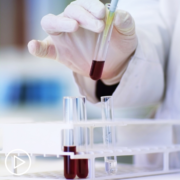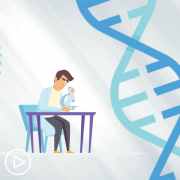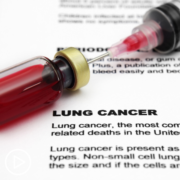Which Tests Do You Need Before Deciding on a CLL Treatment Path?
Which Tests Do You Need Before Deciding on a CLL Treatment Path? from Patient Empowerment Network on Vimeo.
Why do you need biomarker testing before deciding on a treatment plan for your CLL? Learn which key tests should occur before treatment begins and how the results may impact your care decisions.
Related Resources

What CLL Tests Are Essential and How Do Results Impact Treatment and Prognosis? |

|

|
Transcript:
Why do you need biomarker testing before deciding on a treatment plan for chronic lymphocytic leukemia—also known as CLL?
The results may predict how your CLL will behave and could indicate that one type of treatment may be more effective than another.
Biomarker testing—also referred to as risk stratification, genetic, or molecular testing—identifies specific gene mutations, proteins, chromosomal abnormalities and/or other molecular changes that are unique to YOUR CLL.
These changes are only in the CLL cells and do not affect all the cells in your body. These are not genetic changes that you inherit or pass on to your children.
Several tests that may help to guide these decisions, include:
- The FISH test identifies chromosome abnormalities, including high-risk markers like the 17p deletion.
- Next is testing for IGHV mutational status, which determines whether IGHV is mutated in a patient. Mutated IGHV indicates lower-risk CLL.
- Then there is the TP53 mutation status test, which looks for mutations in the TP53 gene.
So why do these tests results matter?
One reason they matter is because patients with certain biomarkers may respond better to one treatment approach over another.
- For example, patients who are IGHV mutated have a special benefit from chemoimmunotherapy with FCR and could consider this approach. Patients who are IGHV unmutated should not consider FCR.
- Additionally, patients with deletion 17p or TP53 mutations should never take chemoimmunotherapy, as it results in only a very short-term benefit.
When are these tests administered?
IGHV status typically doesn’t change over time and only needs testing at diagnosis or before your initial treatment.
FISH and TP53 should be repeated before beginning every treatment regimen, as these results may change over the course of the disease.
How can you make sure you have had essential biomarker testing?
- First, always speak up and ask questions. Remember, you have a voice in YOUR CLL care. Your doctor is expecting you to ask questions and should be able to answer them.
- Ask your doctor if you have had or will receive biomarker testing—including FISH, IGHV, and TP53–and how the results may impact your care and treatment plan. Be sure to ask for paper or electronic copies of your important test results.
- And finally, bring a friend or a loved one to your appointments to help you process information and to take notes.
To learn more about your CLL and access tools for self-advocacy, visit powerfulpatients.org/CLL.










